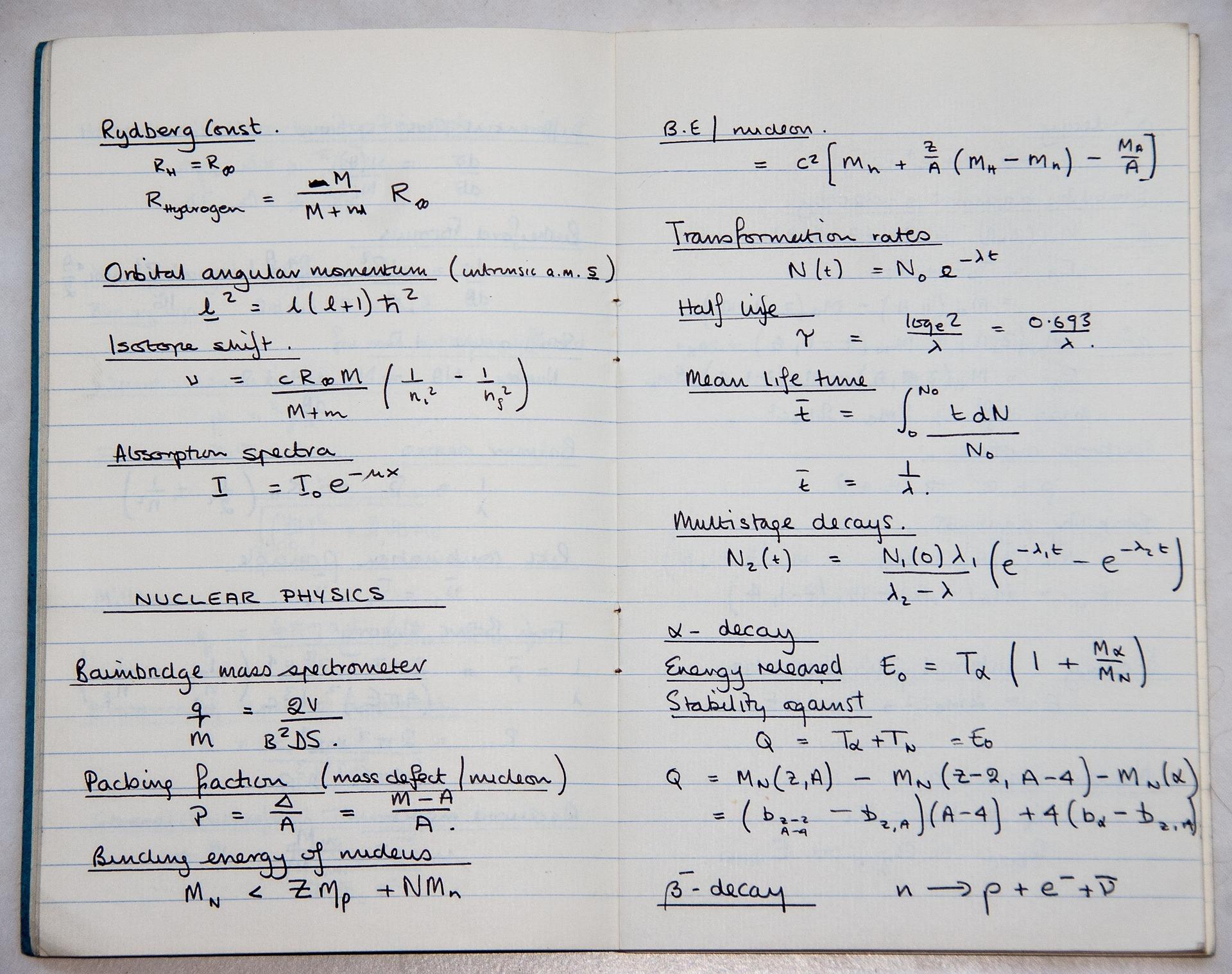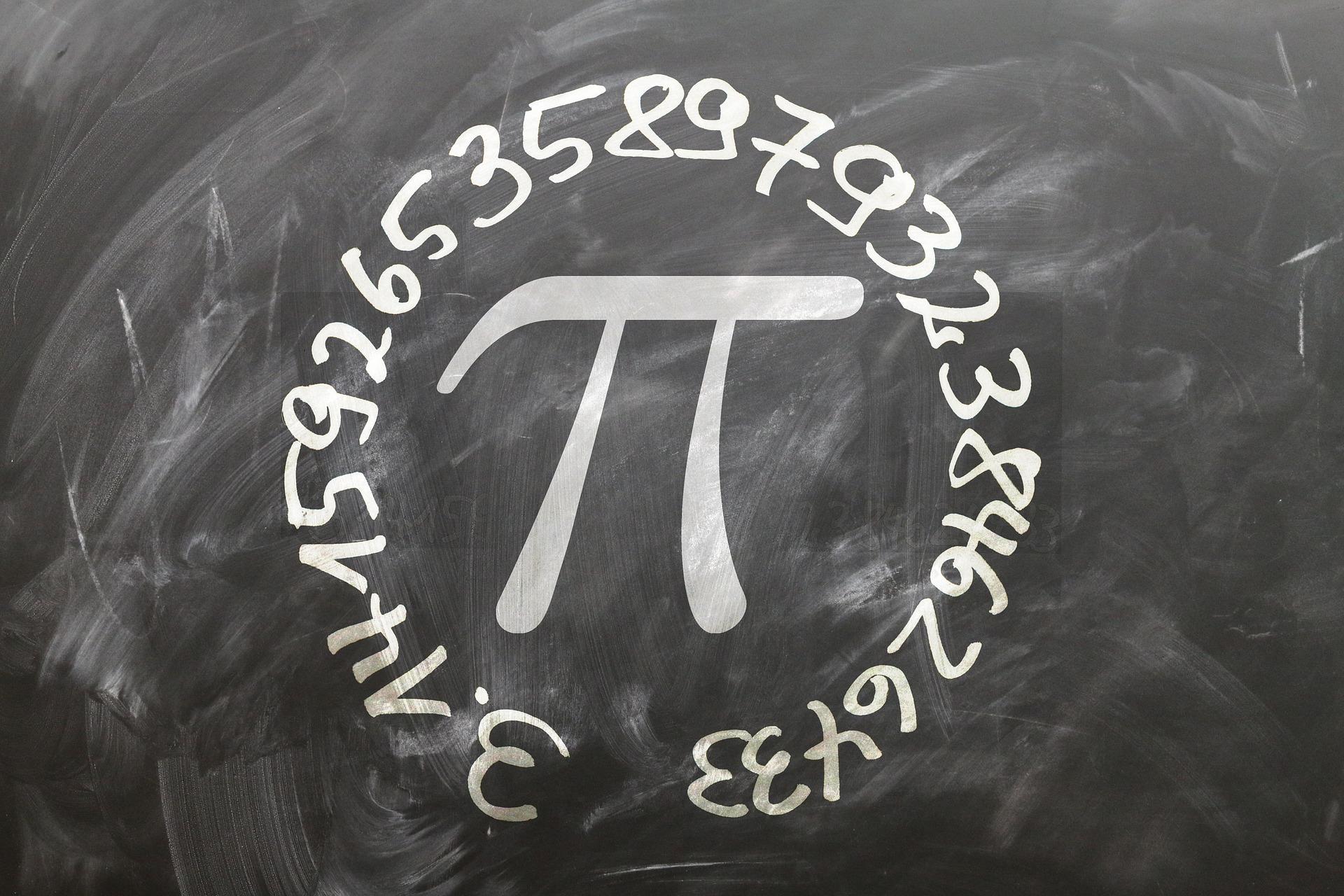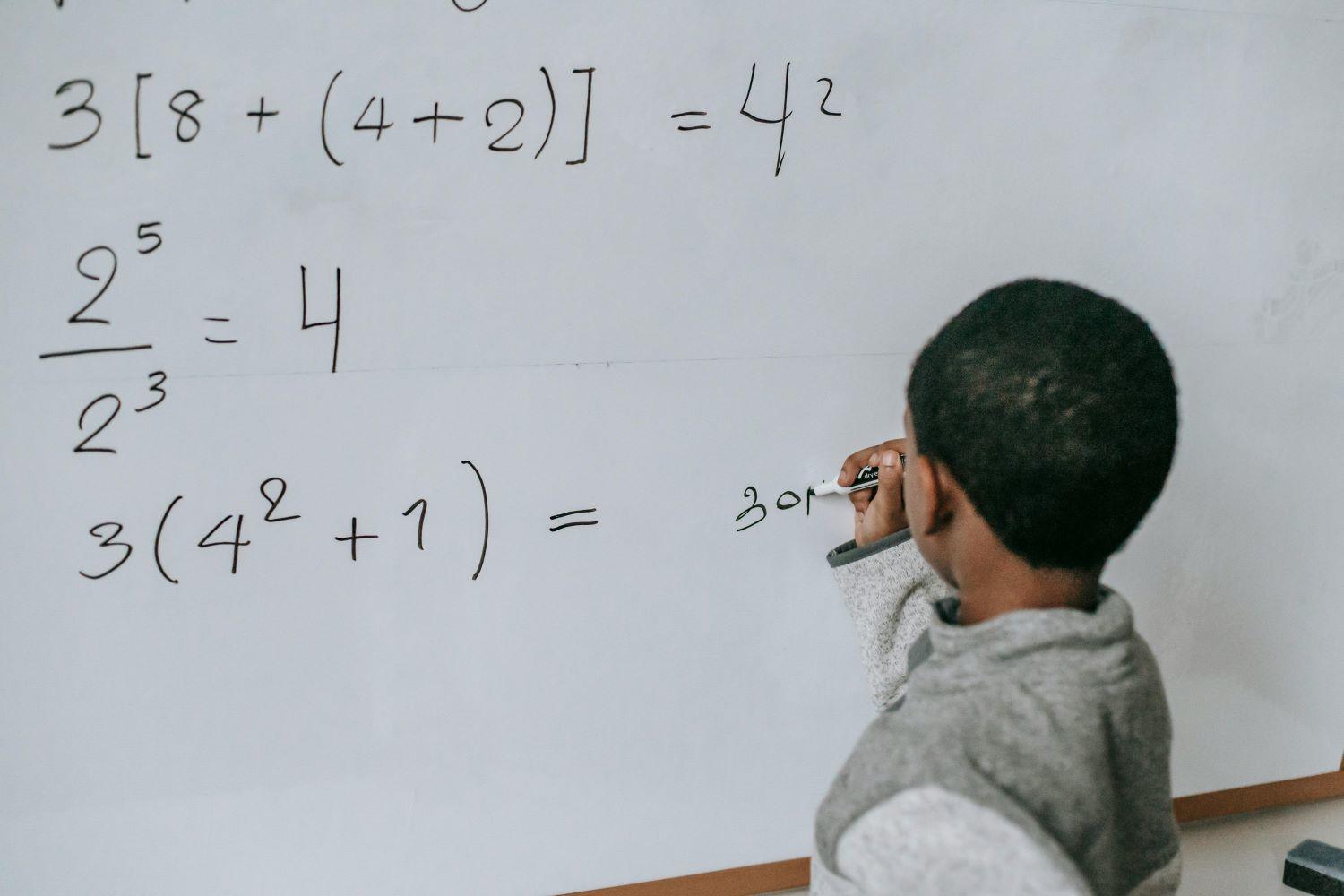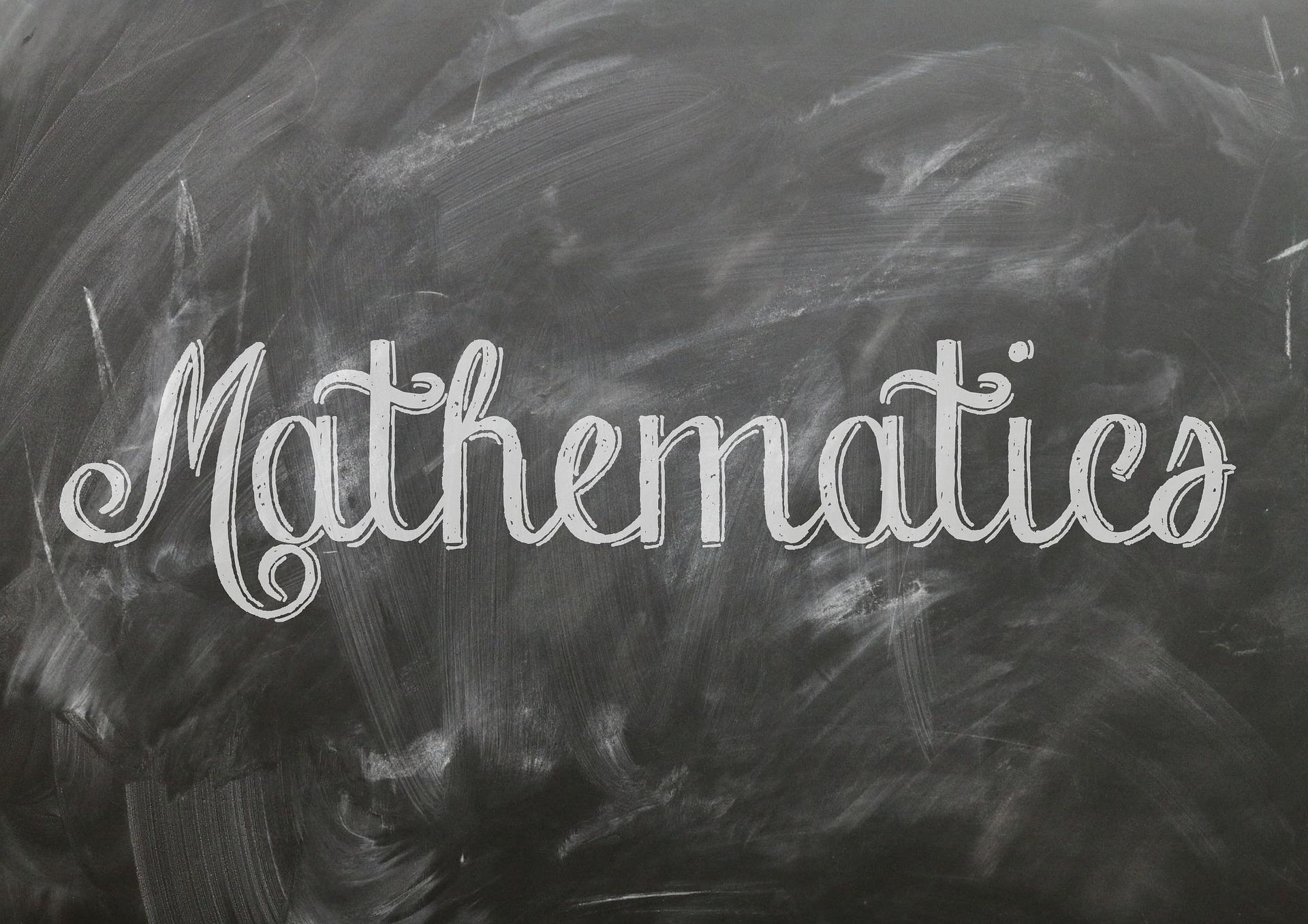“Without mathematics, there's nothing you can do. Everything around you is mathematics. Everything around you is numbers.” - Shakuntala Devi
It would be handy if math were more straightforward, though... Math is about so much more than the result; to be a mathematician, you must understand how to work it out and apply theories to a given problem.
Despite how challenging maths can be, it's not going anywhere and will probably never be removed as an obligatory subject on the national curriculum.
Kids are taught about maths from a young age. They start counting before learning to add, subtract, multiply, and divide. They'll know to do more challenging maths problems as they go through school.
In this article, we will examine why math is essential (both in and outside the classroom) and how you can learn it (even if it's been years since you last studied it!).

Why Learn Math?
At first glance, you might think maths is discrete like some other subjects you must study at school.

Students generally fall into one of two categories: those who love maths, physics, chemistry, etc., and those who love English and the arts. Only a tiny fraction of students love both.
However, unlike what we sometimes think when we're in school, maths can be helpful in life, whether at the checkout in the supermarket or just working out the bill at a restaurant. There's no age limit, either. Students of all ages can work with the maths tutors on Superprof and get some extra instruction to help them. Just search for a "math tutor Toronto" or in another city and you'll easily find the right person.
In a world with diverse disciplines and knowledge, why you should learn mathematics emerges as a beacon guiding you through the intricacies of understanding our surroundings and solving complex problems. Let's unravel the practical magic that underscores the significance of learning mathematics.
There are several reasons as to why people need math tutoring:
- Problem-solving powerhouse: a universal toolkit
First off, mathematics equips you with a versatile toolkit for problem-solving. It provides a systematic approach to dissecting challenges, formulating solutions, and making informed decisions. Whether unraveling complex equations or analyzing data trends, the problem-solving prowess cultivated through mathematics is a universally applicable skill.
- Real-world applications: mathematics in everyday life
Beyond classrooms and textbooks, mathematics seamlessly integrates into our daily lives. From managing personal finances and calculating cooking measurements to understanding timelines and making strategic decisions in various professions, mathematical concepts form the backbone of practical problem-solving in countless scenarios.
- Mathematics driving innovation
Mathematics serves as the driving force behind technological innovation. From the algorithms that power search engines to the encryption protocols securing online transactions, mathematical principles underpin the very fabric of our digital world. Learning mathematics is not merely an academic pursuit; it is an essential step toward understanding and contributing to the evolving technological landscape.
- Critical thinking and logical reasoning
Delving into mathematical concepts hones critical thinking and logical reasoning skills. The process of solving mathematical problems cultivates mental agility, fostering the ability to analyze situations, identify patterns, and make sound decisions. These cognitive skills extend beyond mathematics, enriching overall problem-solving capabilities.
- Global language of science and engineering
Mathematics serves as the universal language of science and engineering. It provides a standardized method for expressing and communicating complex ideas. Proficiency in mathematics opens doors to fields such as physics, engineering, computer science, and more, enabling individuals to actively participate in and contribute to advancements in these domains.
Which is the proper method for you?
The Best Methods for Learning Math Quickly
To motivate yourself to learn math quickly, there's nothing better than contacting private maths tutors if you need someone to teach you math! They'll be able to:
- Help you deal with math problems when you're stuck
- Give you the tools you need to achieve your objectives
- Help you improve your memory and manage your time when studying for math exams
- Share tips, tricks, and methods for students wanting to learn math methods more quickly
- Give you an explanation of word problems
Check for math tutoring in Mississauga here.

Whether you're learning your times tables or studying the complex elements of maths, your private math tutors can help you.
They can tailor their tutorials and use various methods for effectively learning math:
- Theory classes and homework
- Monitoring your progress with exams and tests
- Tips and tricks for solving maths problems
- Games for learning maths
- Exercises, activities, and worksheets to help you understand specific math problems
Qualified and experienced maths tutors are the best option for speeding up learning. They'll each have their own ways of preparing their tutorials, which they'll adapt to your needs, especially if you need to know something quickly. Some of their favourite methods include:
- Repeating formulae aloud
- Explaining concepts back to them in your own words
- Giving you advice for studying
- Asking you to summarise what you've learned after each session
If you must brush up on mental arithmetic, addition and subtraction, multiplication and division, memorising times tables, etc., a math tutor will be your coach. They'll keep you motivated, make sure you're focused on your objectives and effectively manage your time to help you get the most out of your study programme.
On Superprof, students can leave reviews of their tutors so you can see if they're any good. Many students get tutors to help them study math at GCSE or A Level. That said, you can also learn math on your own.
Can You Teach Yourself Math?
You can learn math like you'd study English or history: review past papers and pick up some good study guides.
Find an online math tutor here on Superprof.

Of course, it's not quite that simple: you have to visualise the problem you're presented with and also choose the right approach to solving it.
Plenty of people struggle with maths, confuse prime numbers and relative numbers, and lack the necessary mastery of maths to do any real problem-solving. That's why it's essential for those learning math independently to use the proper methods.
Do you know if you're a visual or auditory learner?
If you do, you can choose learning methods that'll help you learn math quickly:
- If you're an auditive learner, focus on repetition, repeating things aloud as you did with your multiplication tables at school.
- If you're a visual learner, you'll probably want to focus on using visual resources, looking at brightly-coloured diagrams, and seeing fractions as graphs in textbooks and websites.
You'll need to remain motivated to reach your goals. Mathematics requires a combination of several things:
- Work focusing on the foundations of math knowledge (learning tables off by heart, memorising the rules of arithmetic)
- An understanding of how to solve problems by using logic and critical thinking.
While you can learn the former in books, it's more challenging to understand the latter in this way. Your teacher's or tutor's teaching skills will help you determine the reasoning. That's why there are several things you'll need to consider if you're learning math on your own; you can access MOOCs whenever you want online
It can be helpful if you're studying GCSEs or A Levels. A private tutor will encourage you when you're feeling demotivated, but if you're learning independently, you must put a lot of effort in.
Get information about math tutoring in Oakville here.
Don't forget to check out some of these maths websites and apps:
| Resource | Pros | Cons |
|---|---|---|
| Sudoku, Chess, and Board Games | Easy to learn | Not for specific maths skills |
| Montessori | Multi-platform | Just for kids |
| iTooch | Positive reinforcement, progression, built-in calculator | Rigid structure, American school system |
| BBC Bitesize | Wide range of subjects, activities, levels | British curriculum only |
| AB Math Lite | Bright and colourful app, free | Mostly arithmetic, |

Understanding the Building Blocks of Mathematics
Understanding the core principles of mathematics is akin to deciphering the secrets of a profound language. Here, we delve into the fundamental building blocks that lay the groundwork for mathematical prowess.
Mastering the Language of Numbers
Begin your mathematical journey by honing numerical literacy. Grasp the significance of numbers in real-world applications and daily life. Recognize the role of integers, decimals, and fractions as the bedrock of mathematical language.
Algebraic Adventures
Another building brick of mathematics is navigating the realm of algebra, where equations serve as puzzles waiting to be solved. Understand the art of isolating variables and manipulating expressions. Witness the power of algebra in modeling real-world scenarios and problem-solving.
Explore Shapes and Dimensions
Enter the visual realm of geometry, where shapes and dimensions take center stage. Explore the properties of triangles, circles, and polygons. Understand spatial relationships and the beauty of geometric proofs, unlocking a new dimension in mathematical understanding.
Data and Statistics
Also, you have to dive into data and statistics, where numbers transform into meaningful insights. Learn to interpret graphs, analyze trends, and make informed decisions based on statistical reasoning. Appreciate the role of probability in understanding uncertainty.
Calculus: Bridging the Continuous and the Infinite
Furthermore, embark on the journey into calculus, a sphere where the continuous and the infinite converge. Grasp the concepts of limits, derivatives, and integrals, unlocking the ability to analyze change and motion. Witness how calculus underpins advancements in science, engineering, and technology.
Effective Study Techniques: Making Math Learning Enjoyable
Mastering mathematics involves more than rote memorization. It's about adopting effective study techniques that not only enhance understanding but also infuse an element of enjoyment into the learning process. Let's discuss a couple of strategies to make your learning experience through mathematical concepts both engaging and exciting.
Interactive Learning Platforms
Explore online resources, simulations, and educational games tailored to various mathematical topics. These platforms not only provide a dynamic learning experience but also cater to different learning styles, making the process enjoyable in several ways discussed below.
Hands-On Exploration in the Digital Realm
Engage with virtual manipulatives and digital tools that mimic the tactile experience of physical objects. Whether exploring geometric shapes or understanding algebraic expressions, these interactive tools facilitate hands-on exploration in a virtual environment, fostering a deeper understanding of mathematical concepts.
Gamified Learning Modules
You can transform mathematical challenges into exciting adventures through gamified learning modules. Explore platforms that incorporate game elements, rewards, and progression systems to make learning math an enjoyable quest. This approach not only boosts motivation but also instils a sense of accomplishment with each mathematical milestone.
Collaborative Study Sessions: Learning with Peers
Another way to ensure a blissful mathematical learning experience is by harnessing the power of collaborative learning by engaging in study sessions with peers. Explaining concepts to each other not only reinforces your understanding but also offers diverse perspectives. Group discussions and collaborative problem-solving turn the solitary nature of studying into a communal and enjoyable endeavor.
Reinforcing Understanding Through Instruction

Take turns being the teacher in your study group. Teaching concepts to your peers not only solidifies your understanding but also develops communication skills. Explaining complex ideas in simple terms enhances comprehension and enjoyment in the learning process.
Applying Mathematics in Real-World Scenarios
Elevate the learning experience by embarking on group projects that apply mathematical concepts to real-world scenarios. Whether designing experiments, analyzing data, or solving practical problems, collaborative projects inject a sense of purpose into your mathematical endeavors, making the learning process enjoyable and relevant.
Visual Aids and Mnemonics
You can enhance retention and understanding through visual aids and mnemonics. Create colorful diagrams, mind maps, and mnemonic devices that transform abstract concepts into memorable mental images. Associating mathematical ideas with visual cues adds a creative and enjoyable dimension to the learning process. You can incorporate visual aids in the ways explored below
- Navigating mathematical landscapes
Explore the technique of memory palaces to navigate the vast landscape of mathematical concepts. Assign specific mathematical ideas to distinct locations within an imaginary palace. This spatial mnemonic device transforms learning into a mental adventure, making the process enjoyable and effective.
- Flashcards and quizzes
Reinforce your understanding through the use of flashcards and quizzes. These bite-sized self-assessment tools not only aid in recall but also turn the review process into a game-like activity. Interactively testing your knowledge adds an enjoyable and challenging element to your study routine.
Start Learning Math
So how do you choose the proper learning method for you?
Ask yourself a few questions:
- What type of learner am I? Visual, aural, or kinesthetic?
- How much time can I spend studying math per week?
- Do I want to learn by using resources other than textbooks?
- How urgently do I need to learn math?
“My child was struggling with their maths homework in primary school. This trend continued into secondary school. He had a good memory but struggled to concentrate on maths problems. Given he wanted to study the sciences, it was important that he was good at maths and he needed some help! Then we hired Baptiste to teach him. He focused on his strengths and weaknesses and helped build his confidence.”
It's essential to consider your strengths and weaknesses before you start any revision program:
- Suppose you're easily distracted, stressed during exams, or you're not sure how you're going to improve your results. In that case, a private tutor can help you consolidate everything you learn in each lesson with interactive activities.
- If you're more autonomous, you could do online exercises, print out a worksheet, do some quizzes, or play math games on your computer, and soon you'll have mastered what you need to learn.
- Learning depends on your personality, how you learn new information, and how you take notes.
It all depends on how you want to learn. If you're focusing on whole numbers, decimal numbers, or polynomials, you should try to consolidate all your knowledge. To become good at math, you must focus on clear objectives.
What is the Best Methods for Learning Maths Quickly?
In the quest for mathematical proficiency, efficiency becomes a key player. Discovering the best methods for rapid comprehension and retention of mathematical concepts not only accelerates your learning process but also fosters a sense of confidence. Let's explore strategies and techniques designed to expedite your journey toward mastering mathematics.
- Active learning techniques
Activate both your mind and body in the learning process. Techniques such as solving problems aloud, physically moving while studying, or incorporating gestures into your learning routine enhance engagement. This multisensory approach stimulates different brain areas, promoting quicker understanding and retention.
- The Feynman technique: teaching to learn

Embracing the philosophy that teaching is the best way to learn is a good way of learning mathematics. The Feynman technique involves explaining a concept as if you were teaching it to someone else. Simplifying and articulating ideas enhances understanding and facilitates a swift grasp of intricate mathematical concepts.
- Problem-solving sprints
Introduce an element of urgency into your problem-solving routine with timed challenges. Set a specific time limit for solving mathematical problems, encouraging quick thinking and decision-making. These sprints not only hone your ability to think on your feet but also foster a sense of efficiency in mathematical problem-solving.
- Focused practice
Concentrate your efforts on focused and targeted practice. Identify specific mathematical skills or topics that require improvement and dedicate focused practice sessions to them. This deliberate and concentrated approach accelerates skill development and understanding in a shorter timeframe.
- Grouping similar ideas for rapid mastery
Group related mathematical concepts together through conceptual clustering. Identify similarities and patterns among different topics, allowing you to leverage connections and accelerate the learning process. This method of organizing information facilitates a more efficient understanding of interrelated mathematical ideas.
- Online tutorials and video lectures: visual learning for quick grasping
Embrace visual learning through online tutorials and video lectures. Platforms offering visual explanations of mathematical concepts provide an alternative and effective learning mode. Watching demonstrations and visualizing solutions enhances comprehension, facilitating rapid understanding of complex mathematical ideas.
- Digital flashcards: rapid recall for efficient review
Incorporate digital flashcards into your study routine for rapid recall. These digital tools facilitate quick self-assessment, allowing you to review mathematical concepts efficiently. The interactive nature of flashcards turns the review process into a dynamic and time-effective learning experience.
So are you ready to learn the secrets of exponential functions, right triangles, etc.?
Fire up your neurons and start learning! You can even know whilst playing games.
Summarize with AI:















